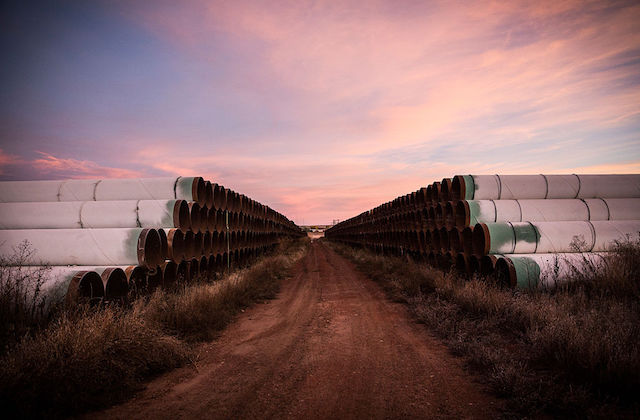The Atlantic Coast Pipeline is a $7 billion proposed project that will run 600 miles of pipes carrying natural gas through West Virginia, Virginia and North Carolina. The energy company behind the project wants it to go through Union Hill, Virginia, a majority-Black town 70 miles from Richmond. How it is attempting to win support from Union Hill residents has environmental justice activists alarmed.
An NBC News article, “How Money Stokes Divide of Historic Black Community in Virginia Pipeline Battle,” written by Erik Ortiz and published today (December 7) examines the way a town is divided over the good and bad of letting Dominion Energy build its pipeline and a gas-fired compression station. It’s a move that could bring future health problems—but also millions of dollars that could help residents. Writes Ortiz:
rnt
As Dominion sought the proper permits for the pipeline and the station, the historically Black community of Union Hill in Buckingham County joined a growing number of environmental groups concerned about the health and climate risks—and critics who say projects like it disproportionately burden minorities and lower-income people.
t
But the energy company, in a push to win the hearts and minds of the county’s 17,000 residents, has taken a different turn, unveiling a series of long-sought benefits to residents who live closest to the compressor station site—a move that has further divided a populace already strained by an undercurrent of suspicion.
In November, Dominion offered Union Hill $5.1 million worth of improvements. These would include a community center, more resources for emergency services and grants for entrepreneurs. In exchange, the town would have to support the completion of the pipeline. Reports NBC News:
rnt
"It was like I woke up one morning and Dominion was in my living room. So I wanted to know, ‘What can you bring to the table?’" said Joyce Gooden, 68, the third generation of her family in the Union Hill area. After moving back earlier this year, she initially questioned the necessity of the project. But the utility, she said, has shown itself to be a courteous neighbor.
t
Gooden, whose brother was hired by Dominion as a community liaison, added, "I’m a nurse by profession—we need an upgraded 911 system."
t
But not everyone sees an infusion of funds as a sign of good faith. Some residents are referring to the pledged money as Dominion’s "plan B—for bribe," and claim it was worked out in "secret meetings."
Opponents to the pipeline say that what Dominion is doing in Union Hill has implications outside the town’s borders:
rnt
But beyond Buckingham County, environmental justice activists and researchers say, there is a larger concern that has not been adequately addressed by policymakers: How communities of color with limited political sway or other economic prospects can be exploited by companies that hold clout with legislators and agencies.
There are a host of risks associated with living close to a pipeline. These include asthma, other respiratory ailments and the chance of an explosion or gas leaking into water sources. Those against this pipeline have other reasons:
rnt
But Buckingham’s history is exactly what should make Union Hill and the region around it off limits, residents say. Unmarked graves identified as slave burial grounds have been discovered, and some households can trace their lineage to slave ancestors and freedmen who settled in the community after the Civil War.
Dominion has faced opposition to the pipeline in places other than Union Hill:
rnt
In the utility’s quest to construct the pipeline, less powerful and historically disenfranchised groups have been affected, according to a study by Finley-Brook: Small farmers have been subject to eminent domain; Native Americans, about 30,000, live within a mile of the proposed route in North Carolina; and another compressor station already in the works in Northampton County, North Carolina, is in a census block where 79 percent of the population is Black.
t
"We should be looking at when projects like these are proposed for places where people have less power to advocate for themselves," Finley-Brook said, "because when you want to build in a mostly White and higher-income community, these projects would be questioned."
Read the entire article here.
